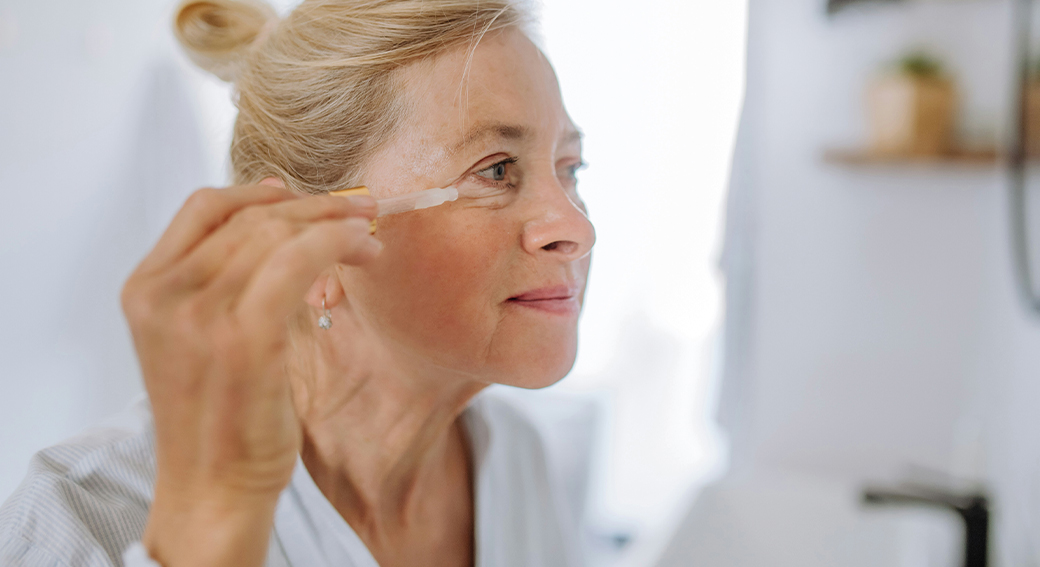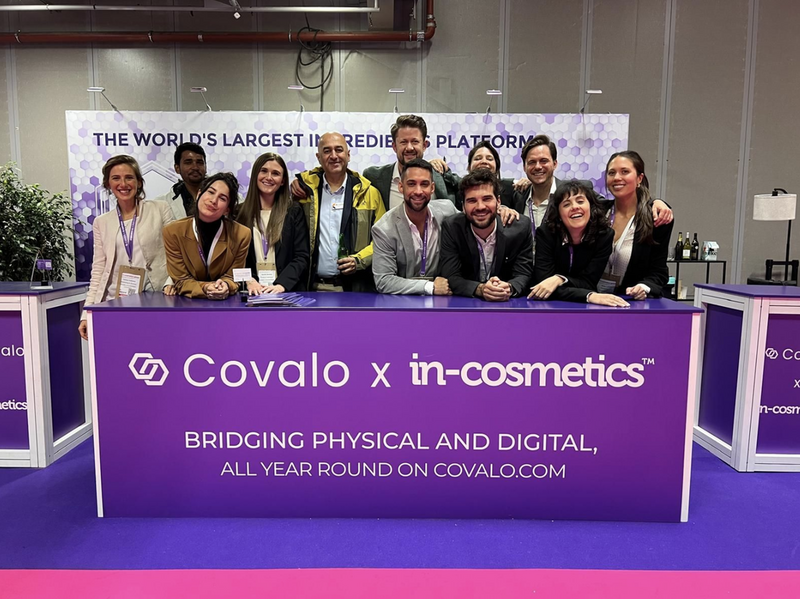
Formulation
on
Skin care
KEYWORDS
Holistic skincare ,
Better ageing,
Formulation trends,
Multifunctional ingredients,
Consumer preferences,
Skincare innovation.
peer-reviewed
The shift from anti-ageing to holistic better ageing: new formulation trends
The Covalo Data & Insights Team
ABSTRACT: Covalo, the world’s largest personal care ingredients platform, highlights the shift from traditional anti-ageing to holistic “better ageing” approaches in skincare. Recent data shows increased interest in multifunctional ingredients like antioxidants, hyaluronic acid, ceramides, peptides, and collagen, which promote overall skin health. This trend reflects a growing consumer preference for products that enhance skin vitality and address multiple concerns simultaneously. Formulators and brands can leverage this insight to create innovative products that meet the evolving demands of discerning consumers.
Ageing is a natural, inevitable part of life that no one is immune to. If we can’t turn back the hands of time, making it impossible to prevent ageing – then why have we been so focused on “anti-ageing” as a concept? In the personal care industry and beyond, there has been a welcome mindset shift towards “Better Ageing” – embracing ageing across all aspects, including skincare, while empowering consumers to look and feel their best, at any age.
Better Ageing refers to an intentional, holistic approach that takes lifestyle choices, mental health, and emotional well-being into account. Not only are we seeing this positive shift in terminology; our Covalo platform data supports the shift from the purely combative and unrealistic “anti-ageing” to Better Ageing.
Better Ageing data insights from Covalo
Covalo is the world’s largest personal care ingredients platform, used by brands and formulators globally to discover and source ingredients from raw materials suppliers. Advanced keyword search paired with a wide range of industry-specific filters allows brands to quickly narrow down and identify the right ingredients for their product development. Through our platform, we have extensive search data that offers deep insights into industry trends and customer preferences. The trends derived from our platform data offers guidance to formulators and brands who are aiming to meet current market demands, enabling them to remain competitive by fulfilling the increasing demands of today’s discerning consumers.
Recent data from Covalo's platform shows a definitive shift from anti-ageing to the holistic Better Ageing approach, when comparing data from May 2024 to that of May 2023. The use of filters for the "Antioxidants," "Moisturising," and "Anti-inflammation" categories has exceeded the traditional "Anti-ageing" category. This shift shows a growing interest in ingredients that promote overall skin health and strength. Consumers are realising that addressing the core needs of the skin will naturally result in Better Ageing skin than traditional anti-ageing methods. For example, searches for “antioxidants” are 5.5 times more prevalent than searches for “anti-ageing”. This makes sense, as antioxidants can be used for protection against environmental stressors and free radical damage, an incredibly important factor in maintaining youthful and healthy skin. Moisturising ingredients are important for maintaining skin that is both supple and radiant, which are both indicators of health and youthfulness. Anti-inflammatory ingredients can soothe the skin, which calms irritations and reduces any redness that might be present. They can also help to prevent long-term damage.
Prioritising the preservation of skin vitality is being recognized as a more valid strategy than simply hiding the appearance of ageing. By adopting a holistic Better Ageing approach, formulators can harness multi-functional ingredients that offer comprehensive benefits. Five ingredient categories in particular stand out for their popularity and effectiveness on Covalo. The growing interest in ceramides, hyaluronic acid, retinol, peptides, and collagen shows a clear desire to address multiple skin issues with one product, a stance exemplified by holistic skincare.

Top 5 Better Ageing search terms
Ceramides are naturally occurring molecules present in the skin’s outermost layers (stratum corneum). By filling in gaps between corneocytes, ceramides form a lipid barrier that can block the evaporation of water through the skin (trans-epidermal water loss). Since the concentration of skin ceramides tends to drop with age, introducing ceramides dermally is especially important for older consumers. Ceramides can protect the skin from intrusion by pollutants, contaminants, and other sources of environmental stress (1). By increasing the skin level of ceramides (which firms up the lipid barrier), regular use of ceramide skincare products can therefore address multiple skin complaints.
Even a short period of topical ceramide application has been shown to significantly increase skin hydration (2). These ingredients also show strong anti-inflammatory action, as they can reduce pro-inflammatory marker expression such as cyclooxygenase-2 (COX-2) and tumour necrosis factor-α (TNF-α) (3). As such, they form a useful and powerful counter to skin irritation. Given that many consumers also suffer from skin that can be sensitive to inflammation, ceramides are a smart ingredient choice for holistic skincare. Consumers can physically see the results, with ceramides being responsible for a reduction in the appearance of wrinkles and fine lines (4). This leads to a positive feedback loop which helps to preserve the skincare regimen and leads to more satisfied consumers.
Another popular ingredient choice is hyaluronic acid. Available in several different molecular weight ranges (which influences the depth of skin penetration), this ingredient is famous for its ability to hold onto large amounts of moisture. It plumps up the skin and is a key choice for skin hydration. By acting as a humectant and attracting/binding moisture to the skin, hyaluronic acid can help to grant dull, dry skin a more youthful appearance (5). The skin cells swell with the additional moisture, pushing out fine lines and wrinkles.
Regular use of topical creams containing hyaluronic acid showed a significant reduction in wrinkle depth and length (6). Beyond hydration, HA-based formulations such as serums and creams have consistently shown an improvement in skin elasticity. The presence of hyaluronic acid stimulates collagen and elastin, resulting in improved skin firmness and texture (7).
Up next is the class of retinoids, specifically retinol. A powerful derivative of vitamin A, retinol enhances collagen production and skin cell turnover (8). This improves the appearance of aged skin. Retinol also regulates genes involved in skin ageing and stimulates new cell production, which can help the skin appear more youthful (9). A placebo-controlled study found that a cream containing retinol, combined with other star active ingredients like hyaluronic acid, significantly improved various signs of facial skin ageing. This included wrinkles, tone unevenness, and dullness, and the improvements lasted for weeks (10).
An eight-week study with Japanese women demonstrated that a retinol-containing lotion significantly reduced wrinkles at the corners of the eyes compared to a control site (11). A one-year study confirmed that 0.1% stabilised retinol could significantly improve photodamaged skin; fine lines, pigmentation, and overall photodamage (12). Histological data indicated increased collagen production and improved skin cell turnover. With such broad benefits, retinol and its associated retinoids are a cornerstone in cosmetic chemistry. Although retinol can cause irritation, combining Vitamin A derivatives with other multifunctional ingredients can reduce this concern.
Another significant area of growth is the use of peptides in anti-ageing cosmetics. They are only needed in small percentages and can result in significant skin improvements. Some peptides work by enhancing collagen production and reducing skin inflammation (13). As an example, after four weeks of use, cosmetic formulations containing palmitoyl peptides have been shown to significantly improve facial wrinkles, skin elasticity, and skin density (14).
Given that peptides cover a wide range of skin improvements, using multiple peptides in the same product can lead to multipronged advances in skin condition. A mixture of peptides (including carnosine and hexapeptide-11) showed significant anti-ageing effects. The product reduced oxidative stress and enhanced the production of elastin in skin fibroblasts (15). Being both powerful and versatile, peptides are key ingredients in holistic skincare.
Collagen is one of the skin’s structural proteins. It plays an important role in maintaining structure and elasticity. By acting as a sort of scaffold, collagen protein provides strength and firmness that helps support the skin's natural resilience and flexibility. The production of collagen declines as humans age. This leads to sagging skin, fine lines, and wrinkles, which are all visible signs of ageing (16). This age-related reduction in collagen production is a key factor in the skin’s natural ageing process.
Both oral and topical collagen supplements offer numerous benefits for the skin. Studies indicate that these supplements can improve skin moisture, elasticity, and hydration. They also help reduce wrinkling and roughness of the skin and can do so with no significant side effects (17). The effectiveness of collagen supplements makes them a popular choice for those looking to maintain youthful, healthy skin.
Collagen is widely used to enhance the appearance and health of the skin. It is incorporated into various skincare products to improve the thickness and strength of skin (18). By boosting collagen levels, these products help to restore skin firmness and reduce visible signs of ageing. The ability of collagen to improve skin texture and resilience makes it an attractive ingredient in anti-ageing formulations.
As we continue to understand more about collagen and its benefits, its application in skincare is likely to expand further. With ongoing research and development, new and innovative collagen-based products will continue to be introduced. The future is bright, with promises of better skin health and beauty.
Key takeaways
Covalo’s extensive data shows a clear shift from traditional thinking. Instead of seeking products that merely cover up or combat ageing skin, consumers believe that a broader, holistic Better Ageing approach leads to genuinely healthier skin. The skincare industry is embracing formulations with ingredients that support skin vitality and well-being, as they result in long-term health and beauty. This shift in thinking and formulating aligns with the growing consumer preference for holistic skincare practices.
By educating consumers on the effectiveness of these 5 Better Ageing ingredient categories, brands can empower individuals to make informed decisions that more closely align with their skin health goals. In parallel, formulators should consider including these ingredients in their formulations, to align with consumer demands and help them age gracefully, with a more “solutions-oriented” approach that is not merely “anti-ageing.” To learn more about these ingredients or discover new ones, leverage Covalo for free.

Conclusion
The future of cosmetics lies in the continued evolution of holistic approaches which represents a transformative shift in the industry, merging scientific advancements, natural ingredients, and wellness principles. By understanding and embracing the interconnectedness of these elements, the cosmetics industry can cultivate products that not only enhance external beauty but also contribute to the overall well-being of individuals and the planet.
The interplay between beauty from within and topical cosmetics is the key for future products. The integration of biotechnology and green chemistry is revolutionizing cosmetic formulations, offering sustainable and biocompatible alternatives.
Developers can implement blockchain to trace the journey of ingredients from source to product. Nevertheless, the efficacy of the natural products should be scientifically proven. Marketers can communicate transparency as a brand value, and parallelly educate consumers by highlighting how specific ingredients contribute to radiant and healthy skin.
By embracing the synergy between these approaches and leveraging scientific advancements, the cosmetics industry can provide consumers with comprehensive beauty solutions that cater to both internal and external dimensions of beauty.
References and notes
- Kendall A, et al. Lipid functions in skin: Differential effects of n-3 polyunsaturated fatty acids on cutaneous ceramides, in a human skin organ culture model. Biochimica et Biophysica Acta. 2017;1859:1679-1689.
- Spada F, Barnes T, Greive K. Skin hydration is significantly increased by a cream formulated to mimic the skin’s own natural moisturizing systems. Clinical, Cosmetic and Investigational Dermatology. 2018;11:491-497.
- Song M, Kim S, Yun H, Kwon S. Anti-inflammatory effect of the ceramide mixture extracted from genetically modified Saccharomyces cerevisiae. Biotechnology and Bioprocess Engineering. 2017, 22: 653-658.
- Takuathung M, et al. Efficacy and Safety of the Genistein Nutraceutical Product Containing Vitamin E, Vitamin B3, and Ceramide on Skin Health in Postmenopausal Women: A Randomized, Double-Blind, Placebo-Controlled Clinical Trial. Journal of Clinical Medicine. 2023: 12.
- Draelos Z, Díaz I, Namkoong J, Wu J, Boyd T. Efficacy Evaluation of a Topical Hyaluronic Acid Serum in Facial Photoaging. Dermatology and Therapy. 2021;11:1385-1394.
- Juncan A, Morgovan C, Rus L, Loghin F. Development and Evaluation of a Novel Anti-Ageing Cream Based on Hyaluronic Acid and Other Innovative Cosmetic Actives. Polymers. 2023:15.
- Bukhari S, et al. Hyaluronic acid, a promising skin rejuvenating biomedicine: A review of recent updates and pre-clinical and clinical investigations on cosmetic and nutricosmetic effects. International journal of biological macromolecules. 2018;120 Pt B: 1682-1695.
- Randhawa M, et al. One-year topical stabilized retinol treatment improves photodamaged skin in a double-blind, vehicle-controlled trial. Journal of drugs in dermatology. 2015:3, 271-80.
- Shao Y, He T, Fisher G, Voorhees J, Quan T. Molecular basis of retinol anti‐ageing properties in naturally aged human skin in vivo. International Journal of Cosmetic Science. 2017:39.
- Oddos T, Roure R, Leyden J, Bruère V, Bertin C. A Placebo-Controlled Study Demonstrates the Long-Lasting Anti-Aging Benefits of a Cream Containing Retinol, DihydroxyMethylChromone (DMC) and Hyaluronic Acid. Journal of Cosmetics, Dermatological Sciences and Applications. 2012: 51-59.
- Kawada A, Konishi N, Momma T, Oiso, N, Kawara S. Evaluation of anti‐wrinkle effects of a novel cosmetic containing retinol using the guideline of the Japan Cosmetic Industry Association. The Journal of Dermatology. 2009:36.
- Randhawa M, et al. One-year topical stabilized retinol treatment improves photodamaged skin in a double-blind, vehicle-controlled trial. Journal of drugs in dermatology. 2015;14 3: 271-80.
- Schagen S. Topical Peptide Treatments with Effective Anti-Aging Results. Cosmetics. 2017;4:16.
- Hahn H, et al. Instrumental evaluation of anti-aging effects of cosmetic formulations containing palmitoyl peptides, Silybum marianum seed oil, vitamin E and other functional ingredients on aged human skin. Experimental and therapeutic medicine. 2016;12 2:1171-1176.
- Wu Y, Cao K, Zhang W, Zhang G, Zhou M. Protective and Anti-Aging Effects of 5 Cosmeceutical Peptide Mixtures on Hydrogen Peroxide-Induced Premature Senescence in Human Skin Fibroblasts. Skin Pharmacology and Physiology. 2021;34:194-202.
- Elmets C. Are Topical Estrogens Effective for Skin Aging?. NEJM Journal Watch. 2008;2008.
- Al-Atif H. Collagen Supplements for Aging and Wrinkles: A Paradigm Shift in the Fields of Dermatology and Cosmetics. Dermatology Practical & Conceptual. 2022;12.
- Rodríguez M, Barroso L, Sánchez M. Collagen: A review on its sources and potential cosmetic applications. Journal of Cosmetic Dermatology. 2018;17:20-26.
